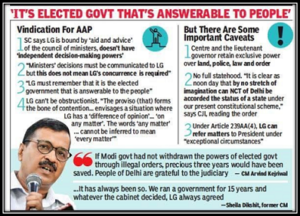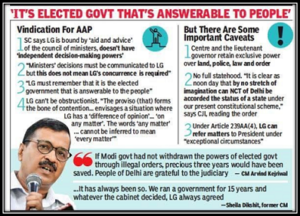Aid and Advise.
Relevance:
GS 2: Indian Constitution—Historical Underpinnings, Evolution, Features, Amendments, Significant Provisions and Basic Structure
Tags: #GNCTD #federalism #aamaadmiparty #indianexpressanalysis.
Why in news:
The Government of NCT of Delhi (Amendment) Bill, 2023 is a controversial piece of legislation that was passed by the Parliament of India on August 7, 2023. The bill nullifies the Supreme Court’s (SC) ruling in favor of the Elected State Government, repeals the Capital Service Control ordinance, and gives the Lieutenant Governor (LG) more control over Delhi’s governance.
A HISTORY OF STRESSED RELATIONS:
- The 2015 Notification added Entry 41 to the list of exceptions under Article 239 AA(3(a)) and granted the LG of Delhi the authority to deal in matters connected with services, public order, police and land in which he can consult the Chief Minister.
- The High Court of Delhi upheld the notification in 2016 that Entry 41 – “Services” is outside the purview of the NCT of Delhi’s legislative assembly and that the government of the NCT of Delhi cannot pass legislation regarding it.
- Following that, the constitution bench of the SC ruled in the case of Government of NCT of Delhi v. Union of India (2023) that the NCT of Delhi has legislative and executive power over administrative services in the National Capital, with the exception of matters relating to public order, police, and land, and that the LG shall be bound by the Delhi Government’s decision in those situations.
- The Central Government subsequently issued The Government of NCT of Delhi (Amendment) Ordinance, overturning the decision of the Apex Court.
- The Delhi Government had appealed against Ordinance to the Supreme Court, which submitted the case to a Constitution Bench for decision-making in July 2023.
- The law was introduced and adopted in the Lok Sabha while the subject was still pending before the Constitution Bench on August 3, 2023. Despite the opposition calling the bill “unconstitutional” as a whole, it was accepted by the Rajya Sabha.
In the Krishna Kumar Singh v. State of Bihar (2017) case SC has ruled that Power to promulgate ordinanceswas conferred on the President to prevent a state of constitutional vacuum when “unforeseen events may arise which need legislative redressal.”
Debate on Act:
Key Features of the Bill:
National Capital Civil Service Authority:
- Act will establish a permanent authority named “National Capital Civil Service Authority” to take decisions with respect to the postings and control of civil servants
- Authority will be headed by the Chief Minister of Delhi and will consist of the Chief Secretary, Government of National Capital Territory of Delhi and the Principal Secretary, Home, Government of National Capital Territory of Delhi.
- The Authority can make recommendations to the Lieutenant Governor regarding transfers and postings of all Group ‘A’ officers and officers of DANICS serving in the affairs of the Government of National Capital Territory of Delhi barring officers handling matters related to public order, land and police.
- Authority can also make recommendations to the LG regarding vigilance and non-vigilance matters for the purpose of initiation of disciplinary proceedings and grant of prosecution sanctions in relation to the above officers.
Section 45D of the Ordinance modified in the Act:
- Modified of Section 45D of the Ordinance, which gave power to the Centre regarding the appointments to statutory commissions and tribunals in Delhi.
- For bodies created under Parliament Laws : members shall be constituted or appointed or nominated by the President
- For bodies created under the Delhi Assembly Laws: National Capital Civil Service Authority shall recommend a panel of suitable persons for constitution or appointment or nomination by the Lieutenant Governor, in accordance with the provisions of section 45H.
Gave extensive power to Lieutenant Governor of Delhi LG:
- LG can also dissolve the Delhi Legislative Assembly. àThis gives the LG the power to end the elected government in Delhi and call for fresh elections. This power has been used by the central government in the past to control the Delhi government.
- LG can veto any decision of the NCTCSA.
- LG’s decision to be final à the Act confers the final authority to the LG. In case of any difference of opinion, the LG’s decision will prevail.
Matters where the LG may act on his discretion are:
- matters outside the legislative competence of the Delhi Legislative Assembly but which have been delegated to the LG,
- matters where he is required by a law to act in his discretion or exercise any judicial or quasi-judicial functions.
- The Bill specifies that in these matters, the LG will act in his sole discretion.
- It expands the discretionary role of the LG by giving him powers to approve the recommendations of the Authority, or return them for reconsideration.
Issues and Concerns associated with Act:
| ISSUES | DETAILS |
| Gives the LG more power over the Delhi government | LG can now appoint, transfer, and suspend all officers in the NCT, except for the CM, ministers, and speaker |
| Undermines the authority of the elected government of Delhi | Delhi government is supposed to be responsible for the day-to-day administration of Delhi, but the LG now has the power to interfere in any matter |
| Violates the principles of federalism | Constitution of India gives states a certain amount of autonomy, but the act gives the central government too much control over the Delhi government |
| Violates the principles of parliamentary democracy | In a parliamentary democracy, the elected government is supposed to have control over the bureaucracy, but the act gives the LG control over the bureaucracy |
| Undemocratic | Act was passed without any consultation with the people of Delhi |
| Seen as a way for the Central government to control the State government | AAP is a regional political party that has been critical of the central government, and the act may make it more difficult for them to function effectively |
| Seen as a step towards the erosion of democracy in Delhi | Delhi government is supposed to be an elected government, but the act gives the LG too much power, which undermines their authority and accountability |
Westminster Model:
It is a system of government that is based on the principles of parliamentary sovereignty, cabinet government, bicameralism, first-past-the-post, party discipline, and judicial independence.
Features:
- Parliamentary sovereignty: The legislature is supreme and can make or repeal any law.
- Cabinet government: The executive is drawn from the legislature and is responsible to it.
- Bicameralism: There are two chambers of parliament, the lower house and the upper house.
- First-past-the-post electoral system: The candidate with the most votes in a constituency wins the seat.
- Party discipline: Members of parliament are expected to vote with their party, even if they disagree with the party line.
- Judiciary independence: The judiciary is independent of the executive and the legislature.
AID AND ADVISE:
- Constitution say that the Ministers hold actual power and the Head Of State is only the symbol of formal authority
- Aid does not mean running to the help of another person; advise does not mean offering solicited or unsolicited counsel.
- Aid and Advise is the essence of parliamentary democracy.
- Highlighted in Articles 74, 163 and 239AA of the Constitution in the context of the roles of the Prime Minister and the President, the Chief Minister and the Governor
- “Babasaheb Ambedkar”, explaining the meaning of the words, said,
“The President ….can do nothing contrary to their advice nor can he do anything without their advice.” Justice Krishna Iyer pronounced “We declare the law of this branch of our Constitution to be that the President and Governor ……shall….exercise their formal constitutional powers only upon and in accordance with the advice of their Ministers save in a few well-known exceptional situations.”
The Government of NCT of Delhi (Amendment) Act, 2023 is a controversial piece of legislation that has been met with a number of concerns and issues like gives the LG too much power and undermines the principles of parliamentary democracy. It remains to be seen whether the Act will be upheld by the Supreme Court, currently hearing the case challenging the constitutionality of the Act.
Source: Indian Express.
Mains question:
Q) Does the Government of NCT of Delhi (Amendment) Act, 2023 undermine the principles of federalism and parliamentary democracy?





